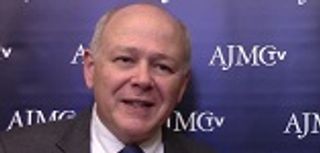
Diabetes
Latest News
Latest Videos

CME Content
More News

This week, the investors and analysts turned their attention to presentations by business leaders at the 36th Annual JP Morgan Healthcare Conference, held in San Francisco, California. Executives from the pharmaceutical and healthcare worlds showcased their products, pipelines, and visions for the future.

Older adults who are prescribed many medications that require frequent trips to the pharmacy are more likely to not refill their prescriptions on time, but patients who participate in medication synchronization programs have improved adherence to cardiovascular medications, according to a study published in Health Affairs.

Brenda Schmidt, CEO of Solera Health, discusses the historic launch of the Medicare Diabetes Prevention Program scheduled for this April and how her company is helping providers and other stakeholders get ready.

Brenda Schmidt is CEO of Solera Health, an integrator that serves as the “back office” for both community-based and digital providers of the Diabetes Prevention Program (DPP), an evidence-based program that has been shown to reduce incidence of people with prediabetes progressing to type 2 diabetes. In April, Medicare will take the historic step of launching the DPP for beneficiaries, and Solera has been at the forefront of helping providers navigate the policy and technical hurdles to serve clients who will take part in the DPP.


The factory-calibrated continuous glucose monitoring (CGM) system is being touted as less expensive, and a spokeswoman said it will not require bundling with a meter, which is required for a competitor.

Dexcom Executive Vice President and Chief Commercial Officer RIck Doubleday visited The American Journal of Managed Care® to discuss Medicare reimbursement for the Dexcom G5 and a new partnership with Fitbit.

Rick Doubleday is the executive vice president, and chief commercial officer at Dexcom. He is responsible for the sales, marketing and customer service functions. Previously, Doubleday led all sales and marketing functions for the company, driving the acceleration of worldwide awareness and adoption of Dexcom continuous glucose monitoring (CGM). Doubleday visited The American Journal of Managed Care® this fall to discuss bringing the Dexcom G5 to Medicare beneficiaries.


Cost considerations and potential for prevention covered in current issue of Evidence-Based Diabetes ManagementTM.

The FDA has approved the sale of the Dermapace System, the first shock wave device intended to treat diabetic foot ulcers.

Adapting payment models to reward outcomes is key to making lifestyle change fit into a managed care framework, several articles find.


Every week, The American Journal of Managed Care® recaps the top managed care news of the week, and you can now listen to it on our podcast, Managed Care Cast.

This week, the top managed care stories included the elimination of the Affordable Care Act's individual mandate; a new gene therapy for inherited vision loss that could cost $1 million; and a study found that social isolation can increase the risk of type 2 diabetes.

Key drug approvals; alcohol cancer link.

Articles on type 2 diabetes management, colon cancer screenings, and anti-rheumatic drug approvals topped the list.

Although patients and physicians both recognize the need to discuss obesity, the lack of resources, time, and expertise often prevents physicians for offering care and patients from asking for it, explained Todd Hobbs, MD, Novo Nordisk’s vice president and chief medical officer.

A new sodium-glucose co-transporter 2 medication to treat type 2 diabetes is joining the field: the FDA approved ertugliflozin (Steglatro) from Merck and Pfizer as a single therapy and in combination with Merck’s sitagliptin (Januvia), a DPP-4 inhibitor, or with metformin.

In 2017, The American Journal of Managed Care® (AJMC®) covered conferences on a range of topics: oncology, diabetes, managed care, and much more. however, the most-read coverage from conferences that AJMC® attended mostly focused on cardiology trial results, particularly the cardiovascular results of diabetes medications.

Trial results have shown that alirocumab (Praluent) is safe and effective across patient populations, said Jay Edelberg, MD, PhD, vice president and head of Cardiovascular Development and Cardiovascular Affairs at Sanofi.

An interview with one of the authors of a large observational study that has seen findings consistent with recent cardiovascular outcomes trials in SGLT2 inhibitors.

A least one US payer, CareMore, has a program to combat loneliness in seniors to prevent chronic disease and other health problems.

Currently, clinical guidelines offer little guidance on deintensifying care, which is critical for balancing overuse and underuse of services.

What the CEO of the American Association for the Advancement of Science thinks about the current controversy.


















